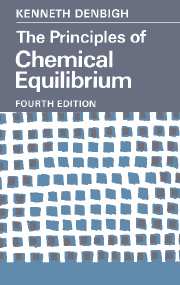Book contents
- Frontmatter
- Preface to the First Edition
- Preface to the Fourth Edition
- Contents
- List of Symbols
- Values of Physical Constants
- PART I THE PRINCIPLES OF THERMODYNAMICS
- PART II REACTION AND PHASE EQUILIBRIA
- PART III THERMODYNAMICS IN RELATION TO THE EXISTENCE OF MOLECULES
- Chapter 11 Statistical Analogues of Entropy and Free Energy
- Chapter 12 Partition Function of a Perfect Gas
- Chapter 13 Perfect Crystals and the Third Law
- Chapter 14 Configurational Energy and Entropy
- Chapter 15 Chemical Equilibrium in Relation to Chemical Kinetics
- Appendix: Answers to Problems and Comments
- Index
Chapter 11 - Statistical Analogues of Entropy and Free Energy
Published online by Cambridge University Press: 05 June 2012
- Frontmatter
- Preface to the First Edition
- Preface to the Fourth Edition
- Contents
- List of Symbols
- Values of Physical Constants
- PART I THE PRINCIPLES OF THERMODYNAMICS
- PART II REACTION AND PHASE EQUILIBRIA
- PART III THERMODYNAMICS IN RELATION TO THE EXISTENCE OF MOLECULES
- Chapter 11 Statistical Analogues of Entropy and Free Energy
- Chapter 12 Partition Function of a Perfect Gas
- Chapter 13 Perfect Crystals and the Third Law
- Chapter 14 Configurational Energy and Entropy
- Chapter 15 Chemical Equilibrium in Relation to Chemical Kinetics
- Appendix: Answers to Problems and Comments
- Index
Summary
Thermodynamics and molecular reality
The whole of classical thermodynamics is based on the empirical laws which lead to the notions of temperature, internal energy and entropy as functions of state. At no point in the development of these laws, or of their consequences, does any reference need to be made to the idea that matter consists of ultimate particles, i.e. the atomic theory. But thermodynamics gives an insight neither into the possible origin of its laws nor any means of making a direct calculation of the thermodynamic properties of a substance. It is the purpose of statistical mechanics to advance knowledge in both of these directions.
First of all it is shown that the laws of thermodynamics are a consequence of the postulates of the quantum theory, together with one other postulate which is of a statistical character. Secondly statistical mechanics makes it possible to obtain important new theorems not known in pure thermodynamics, including methods of calculating heat capacities, free energies, etc., from spectroscopic data.
Statistical mechanics is a large subject, and it is not possible to put forward an entirely rigorous treatment in a short compass. In the present chapter the main ideas will be developed in a fairly simple manner, and the formulae obtained will be applied in subsequent chapters to perfect gases, crystals and reaction kinetics.
The quantum states of macroscopic systems
The whole of this chapter is concerned with the quantum states of macroscopic systems.
- Type
- Chapter
- Information
- The Principles of Chemical EquilibriumWith Applications in Chemistry and Chemical Engineering, pp. 333 - 360Publisher: Cambridge University PressPrint publication year: 1981



